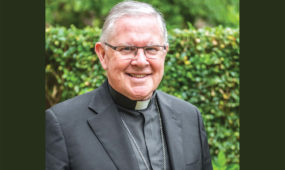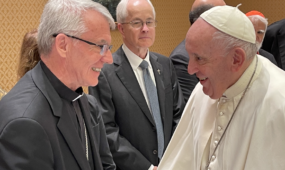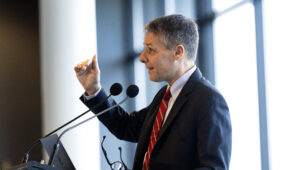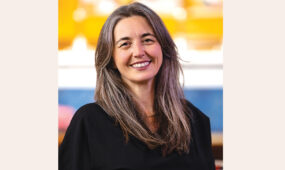Conscience and truth in politics
Opinion
So soon after our State election we are now facing a Federal election. Once again let’s reflect upon the election in the light of our faith and take seriously the responsibility of voting for the best outcome for all in our country.

We draw upon the long tradition of Catholic Social Teaching begun in 1891 with the Papal Encyclical Rerum Novarum by Pope Leo XIII. The main principles of this tradition can be summarised as: the common good; solidarity and subsidiarity; human dignity and the universal destination of goods. We should add to this, the preferential option for the poor.
Let me focus on the little-known principle of subsidiarity. It too comes from Rerum Novarum as an attempt to articulate a middle course between laissez-faire capitalism on the one hand and the various forms of socialism, which subordinate the individual to the state, on the other. It was Pope Pius XI in his 1931 encyclical Quadragesimo Anno who summarised the development of this principle, and I quote:
Advertisement
‘Just as it is gravely wrong to take from individuals what they can accomplish by their own initiative and industry and give it to the community, so also it is an injustice and at the same time a grave evil and disturbance of right order to assign to a greater and higher association what lesser and subordinate organisations can do. For every social activity ought of its very nature to furnish help to the members of the body social, and never destroy and absorb them.’
At that time, it was a response to German national socialism and Soviet communism on the one hand and Western capitalism on the other.
Put simply, it says that you don’t give to a higher, distant or centralised body what can be accomplished and is the responsibility of an individual or local initiative. Or again, responsibility for action is best attributed to those directly involved. Larger bodies work best when they support and encourage local bodies closer to the problem and not by taking them over.
Advertisement
What’s the relevance of this principle for us today? Generally, we do have a good balance between the relationships between federal, state and local governments and the freedom of individuals and smaller communities. Compared to the USA we have a much better balance between personal initiative and the common good of all citizens, for example a national health scheme, welfare system and national disability scheme, but there’s always more to do in these areas. However, my concern is that we too easily presume that legislation, centralised bodies, sanctions and penalties can solve all our social problems. Governments have acted beyond their authority in issues of life, death and marriage. As Jesus said to Pilate: ‘You would have no power over me if it had not been given you from above.’ Here’s the ultimate principle for all governments to acknowledge. Authority is rested upon a government from above through the consensus of its people. We neglect transcendence at our peril.
Hence in the upcoming election, not overlooking many other important issues, the passing of a Religious Discrimination Bill is a key issue. The freedom of religion is a fundamental human right named and guaranteed in our Constitution. However, we have seen that popular political correctness can easily overshadow religious freedoms. Our Catholic schools, hospitals and nursing homes must be free to operate according to our principles and be able to employ people who will acknowledge and support our Catholic identity. Keep in mind that this is more than about protecting our own faith. Religious freedom goes hand in hand with the respect of the conscience of each individual, as conscience is the voice of God echoing deep within us that points towards the truth.
Related Story
 National
National
Bishops identify key election issues
Leading up to the presidential elections in the USA in 2008, Bishop Lori, chair of the USCCB Committee on Doctrine issued a statement entitled ‘Conscience and the Catholic Voter’ and I quote:
‘A well-formed conscience is standard operation equipment for participation in the political process…what really forms our consciences is the truth…If no one has the truth, politics becomes a matter of who has the most power. Power politics devoid of truth cannot unify the nation or protect the common good…Pope Benedict has called upon us to build what he and Pope John Paul II have called ‘a civilisation of love,’ a civilisation where the rights and dignity of each person – especially those who are most vulnerable, the unborn and the frail elderly – are respected from the moment of conception until natural death; where family, based on the love of husband and wife, welcomes children…where the hungry and homeless are assisted, the immigrant welcomed, the environment protected, and all legitimate paths to peace are pursued.’
My concern in Australia today is that pragmatic popular thinking aka political correctness has overshadowed human conscience and the traditionally held norms of the truth of human nature and life. Without an acceptance of conscience and truth in political life we are left with the ones who shout the loudest and no lasting focus for unity.
In conclusion, take seriously your obligation to vote. Study the policies of the various parties but go beyond them as well. Pray about your vote and then vote with your conscience formed according to the values of our faith.
Fr Dean Marin is Adelaide’s Vicar General








Comments
Show comments Hide comments